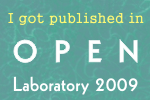I have recently been invited to Google+, (thanks Ruchira!) and as social timesucks go, it is quite enjoyable. Here are my first impressions about g+. In a nutshell: g+’s attempt at compartmentalized communication is laudable, but falls short of the mark. Mainly because, no social network can emulate the real-life way we communicate (or not) with […]
Nearly a year ago, I posted about the Critical Assessment of Function prediction with which I am involved. The original post from July 22, 2010 is in the block quote. After that, an update about the meeting which will be held in exactly 2 weeks. The trouble with genomic sequencing, is that it is too […]
For some time now, NERC has been providing us with Bio-Linux. If you don’t want to be bothered with installing all the essential bioinformatic software for your Ubuntu box, you can install Bio-Linux, either as a a Linux distro for installation from scratch, or as a set of packages for an already existing Debian or Ubuntu […]
Some time ago an article in Linux Journal discussed the adoption of free/open course software (FOSS) by the general public. The article (I can’t seem to find it now) talked about the people that do not care about the distinction between Free as in Free Beer vs. Free as in Freedom (libre). They want software […]
The Genome Center at University of California Davis and researchers at UC Santa Cruz are organizing a genome assembly competition which they call The Assemblathon. They have released two simulated genomes for competing groups to assemble as best they can. Assemblies are due February 6th, 2011. So there is still time, if you would like […]
This seems very promising: two consecutive workshops on biological Wikis in Naples. If you have a life-science related wiki, plan on doing one, or just want to learn about how collaborative authoring can help your work, this would be a great place to do so. Thanks to Paolo Romano for the information. Joint NETTAB 2010 […]
I’m organizing a workshop later this month (see here, scroll to session V), and I have just received the attendees list from the main conference’s organizers. Since I need to spam send the attendees informative email on the specific workshop, I needed their email addresses. Here’s what I did. The file itself is MS Word […]
The trouble with genomic sequencing, is that it is too cheap. Anyone that has a bit of extra cash laying around, you can scrape the bugs off your windshield, sequence them, and write a paper. Seriously? Yes, seriously now: as we sequence more and more genomes, our annotation tools cannot keep up with them. It’s […]
A few science apps for the Android mobile phone operating system. Some of these I have, some I don’t , and some I really would like to check out. Feel free to add more that you know of in the comment section. Better yet, make a wish… Science Literature: AgileMedSearch: Searching through pubmed databases. Pretty […]
AMOS is a suite of genome assembly and editing software. It includes assemblers, validation, visualization, and scaffolding tools. I have been having some issues installing AMOS on Ubuntu 9.10. Specifically, Ubuntu 9.10 has gcc 4.4, which breaks the compilation of the AMOS release version. However, the development version has been fixed to accommodate that. If […]
Pharmaceutical companies are always on the lookout for secondary drug targets. After all, if you invest billions developing a single drug, you would be more than happy to sell it as a treatment for two, three, or more different ailments. Sildenafil citrate was developed to treat angina and hypertension, but during phase I clinical trials, […]
I just spent the better part of a Saturday playing with Foldit. Foldit is an ongoing experiment in finding protein structures by harnessing the power of the mob – or gamers, as is the case here. The player is presented with a backbone & sidechain configuration, with the secondary structures mostly pre-determined. The problem is […]
A nice take on the vi / emacs wars Also, real programmers browse the web using the vimperator.
GOA, the Gene Ontology Annotation, provide Gene Ontology annotation to proteins in UniProt. It also provides GO annotations to several genome projects: Chicken, Arabidopsis, Fly, Human, Mouse, Rat and Cow. Anyone working on any of those genomes, or on UniProt and is interested in annotation, would most likely need to query GOA once in a […]
I was recently reminded of this classic by Geoffrey James. Here are a few of my favorites. The whole text is available online. In the beginning was the Tao. The Tao gave birth to Space and Time. Therefore Space and Time are Yin and Yang of programming. Programmers that do not comprehend the Tao are […]





